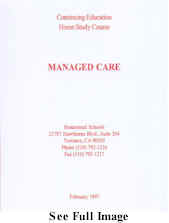
|
Managed Care |
After completing the course, you’ll be able to:
Provide useful information for healthcare professionals on the evolving managed care environment and the importance of continuing nursing education in this market. Within the past few years, our entire country has shifted toward a managed care model for providing healthcare to millions of people. As a result of this shift, nurses face the stark possibility that their employment with a particular employer may be ending through “downsizing.” Their positions may be eliminated or filled by a less skilled worker trained to assist the remaining registered nurses on that shift or unit.
Education
As our country continues toward a managed care model, it is imperative that nursing professionals educate themselves and prepare for the future of nursing, in which change is inevitable. One must look toward change as the ability to seek out new opportunities and to grow and better oneself.
Nursing education can take many forms. As a result of mandated cross training within many healthcare settings, nurses are being educated in areas they may never have focused on before. Education opportunities may include furthering academic degrees, cross training or additional certifications, as well as an understanding of the multidisciplinary role nurses’ play in the realm of healthcare. Nurses provide a broad range of skills and caring for patients within nursing and multidisciplinary teams. Therefore, within these chapters, nursing care is not only described as nursing care but also as healthcare because that is what nurses truly provide. Many lay people still stereotype nurses as those who “give shots” and “take temperatures.” As professionals, we know we provide much more than that. Each day, nurses make complex decisions based on finely tuned assessment skills concerning the health of our patients. Nursing needs to continue educating others’ about “what we do” and “who we are.” It is the author’s hope that the information presented will empower nurses to accept and grow with the past and future changes in providing healthcare. An additional focus is to have nurses provide a “nursing presence” in the managed care market with the goal of promoting nursing as the professional organization it is.
Focus
There are many areas of interest to nurses in relation to managed care. Due to the complexity of expansive impact managed care has had and will continue to have on how we do what we do; the major focus of Managed Care will be an overview of “managed care.” While we continue to provide nursing care and make healthcare decisions, we must be aware of what is happening on a local, regional, and national level. Company decisions will affect how we provide care and so too will national trends and policies. An important factor which appears to influence managed care is the perceived financial gain and cost effectiveness which results from the managing of patients’ care. The managing of patient care is here to stay. Nurses must continue to work within the changing environment. Too often, we view managed care as a negative entity but do nothing to change or influence decision making.
The management of patient care may include the lifespan of individuals, from the beginning of one’s life through the ending of one’s life. Nurses are capable of providing this type of managed care because caring for patients is of primary focus in nursing.
Wait crucial question remains a part of all health care professionals and providers? The hundred dollar question is, “What is the place of health professionals as we journey toward the 21st century?” Importantly, what is the definition of the word health and do we provide care for health? According to the Dorland Medical Dictionary, health is defined as “a state of optimal physical, mental and social well being and not merely the absence of disease and infirmity.” When words such as “optimal” are used, the implication is that someone passes judgment. It may not necessarily mean the best, but it implies that there is nothing better, under the circumstances, and that nothing more favorable can be obtained.
Other important questions are: Who is the best qualified to determine health? Who can or should evaluate all the circumstances and decide that the health condition is now at the “optimal” level?
Is it the recipient of health care, the patient, or is it the health care provider? Perhaps the decision maker is the medical/legal establishment, lawyers, courts, third party payors, and administrators? Maybe the best person to determine health would be anyone related by blood, marriage or business in regards to each individual case? Still others believe the government and associated social programs determine one’s health.
Managed care in the 21st century will continue to be a complex issue and one in which nursing professionals will be directly involved. What will your involvement consist of?
Table of Contents
Preface
One: Historical Influence
Two: Managed Care Overview
Three: Healthcare Reform
Four: Reimbursement
Five:Utilization Management
Six: Utilization Review
Seven: Ethical Aspects
Eight: Managed Care Guidelines
Nine:Managed Care and Cost Containment
Ten:Managed Care and Technology
Eleven:Nursing Opportunities in Managed Care
Twelve:Terminology
Thirteen: Final Exam
Bibliography
|
© 2007 Homestead Schools, Inc. - Webmaster : Shawn J. Cassick |